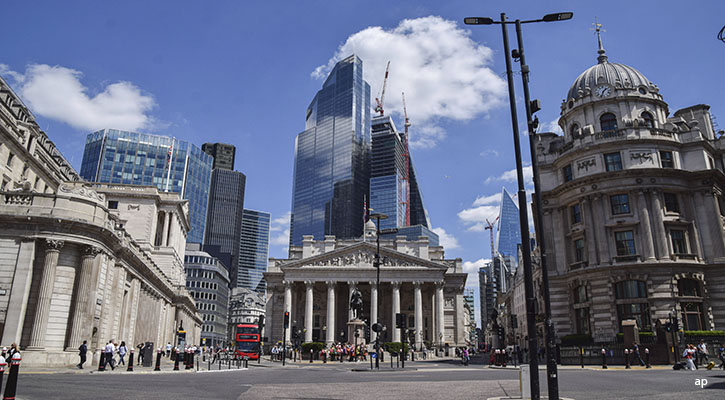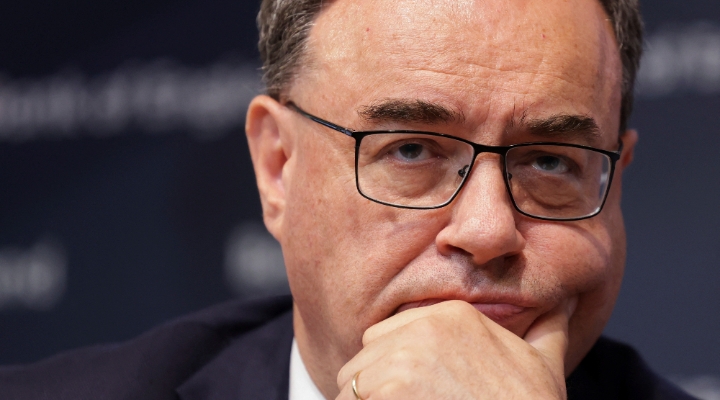
Bank Governor Andrew Bailey is not one for emotive or incautious language so onlookers would not have expected him to be more upbeat than he was at the June 2023 press conference, which followed a surprising 50 basis point increase to take interest rates to 5%.
Yesterday he was announcing a more modest rise, the 14th in a row, and that followed a fall in inflation that may be the decisive pivot after 10%+ CPI numbers.
But even by his standards, he struck a downbeat tone from the start. From the off, we sensed there was no room for "mission accomplished" style complacency. Instead he softened us up to the idea that "high inflation could persist for longer".
The Bank’s forecasts now see inflation falling back to the 2% target in 2025, by which time we may have a new government. CPI is likely to be 5% by the end of the year, according to its models. But it’s going to hang around, and that means interest rates will stay high.
Having set the mood music from the start, he and his colleagues then tried to unpick the August monetary policy report and field the usual journalist questions.
Here are some talking points from the press conference.
When Are You Cutting Rates?
What everyone in Britain really wants to know is: when will the Bank stop raising rates and even start to cut them? Asked this question by Bloomberg’s Francine Lacqua, Bailey immediately sensed the trap he was being led into and said "it's far too soon to speculate on rate cuts". Monetary policy will be "sufficiently restrictive for sufficiently long" until the battle against inflation has been won is the message from this month’s meeting. We see "different paths for rates" and there is "no presumed path", Bailey added. The translation: it’s probably too soon to start this conversation. We are behind the US in this regard. But if the data changes, the response may change, the BoE says. It's wait and see.
Not All Dragons Have Been Slayed
To that end the Bank started us worrying about other types of inflation. Energy and food have been tamed, for now, but services inflation is something else we need to worry about.
Wage inflation remains a worry too, although there are signs the labour market is loosening (ie workers have less bargaining power as the jobs market slows). Ben Broadbent, deputy governor for monetary policy, caused a bit of a stir by sating real incomes (after inflation) are now growing. Challenged on this, he said more recent data is showing that is occurring now – and that average wage growth will be above inflation in the fourth quarter. This would be a significant move as high inflation has meant wages have not kept up with price rises – which means people are getting poorer.
Pain Thresholds
In the 1990s the Conservative Party deployed a slogan that would probably be deemed too risky today: "yes it hurt, yes it worked."
The Bank doesn't go for that kind of rhetoric but it is aware that interest rate rises cause pain for homeowners taking out new mortgages and for businesses borrowing money.
Asked by the Guardian’s Larry Elliott whether the real messaging is that "a certain amount of pain is inevitable" (and even necessary), Bailey said: "I would not use words like pain because the economy is more resilient […] and there’s a good news element to that".
The background is that the Bank had previously forecast recession but has now produced more rosy estimates. If viewers wanted some good news, that was it.
Housing Crash?
Bailey noted the recent house price surveys – such as the recent Nationwide data – but said this wasn’t a crisis, but a period of "adjusting" and "moderating" because lending figures still look in decent shape.
Model Behaviour
Some people have criticised the Bank for not responding soon enough to inflation – and others have been angry at interest rate rises, which have gone from 0.1% to 5.25% in less than two years.
Richard Murphy, an economist and accounting professor, described rate hikes as "economic insanity" that will trigger a recession. Naturally, Bank officials are, shall we say, defensive about accusations they got inflation wrong and are now getting interest rates wrong.
This marks a distinct shift from the Carney era; while the Bank caught flak over "forward guidance", it was under less pressure to justify its decision making (it rarely raised rates so that was an easier conversation to have.)
The Bank itself has admitted forecasting errors – and to that end, Ben Bernanke, a former Fed chair and uber central banker, will now conduct an inquiry into what went wrong.
Officals like Broadbant were keen to stress the Bank’s models couldn’t cope with the outliers of a pandemic and the Russian invasion. It’s "not a question of the models being wrong", Broadbant said, insisting that the decisions are "the best collective judgment of the committee".
So models are not mechanical, taking inputs from human expertise. For his part, Bailey was keen to stress the MPC is always learning lessons but doesn’t indulge in hindsight.
Neutrality Issues
I wondered yesterday how many BoE press conferences I've watched. Certainly this covers the King-Carney-Bailey era, which is a lot. And then I started to wonder who watches these things apart from finance journalists/eco nerds (guilty), but does the general public? The press conferences are streamed on YouTube and via the Bank website so I assume the potential audience is wide. But there's always a moment when I think the MPC flips back into "academic mode".
Yesterday's example came when ITV's Joel Hills, someone very connected to the real world, asked a question about neutral interest rates. Ben Broadbent's eyes went all dreamy because he could digress from boring chat about mortgages and talk about academic papers. Papers from American academics are the best in this regard for generating economist reveries. The "neutral rate" is of interest to you and me because it could point to where rates may be in the future in a low inflation environment. We're a long way from that scenario but 2.25% was floated as a figure that's "not too hot, not too cold". That's certainly better than 5.25% for those who need to borrow money or even fix mortgages for longer than two years.




























